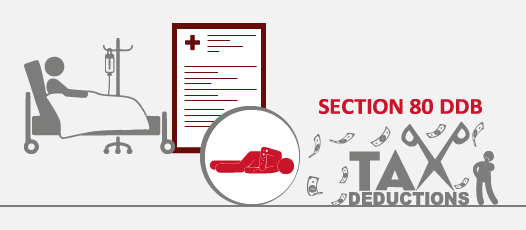The Benefits of 80DDB Deduction
When it comes to optimizing your tax savings, understanding the various deductions available is crucial. One such deduction that can significantly benefit taxpayers is the 80DDB deduction. In this comprehensive guide, we will delve into the details of the 80DDB deduction and provide you with all the information you need to unlock its benefits.
Our approach in this guide follows the MECE (Mutually Exclusive, Collectively Exhaustive) framework, ensuring that we cover all the essential aspects of the 80DDB deduction in a structured manner.
80DDB Deduction

What is 80DDB Deduction?
The 80DDB deduction is a provision in the Indian Income Tax Act that allows taxpayers to claim deductions for expenses incurred on specific medical treatments. Its primary purpose is to provide financial relief to individuals or their dependents suffering from specified medical conditions.
To be eligible for the 80DDB deduction, taxpayers must meet certain criteria, such as being a resident individual or a Hindu Undivided Family (HUF) and having incurred expenses for the treatment of specified diseases.
Medical Conditions Covered
The 80DDB deduction covers a range of specific medical conditions. These include but are not limited to:
Cancer
Neurological diseases like Parkinson’s, Alzheimer’s, etc.
Chronic Renal Failure
Hematological disorders
AIDS
Chronic Kidney Disease
These conditions are severe and require extensive medical treatment and care.
Qualifying Expenses
The 80DDB deduction covers various types of expenses incurred for the treatment of specified diseases. Qualifying expenses may include:
Hospitalization costs
Diagnostic tests
Medication expenses
Doctor’s consultation fees
Costs of specialized treatments
Maximum Deduction Limit
Under the 80DDB deduction, there are maximum deduction limits that taxpayers can claim. The limits vary based on the age of the individual and the category of taxpayer. As of the current tax regulations:
For individuals below 60 years of age, the maximum deduction limit is INR 40,000.
For individuals above 60 years but below 80 years of age, the maximum deduction limit is INR 1,00,000.
For individuals above 80 years of age, the maximum deduction limit is INR 1,00,000.
Documentation and Proof
When claiming the 80DDB deduction, maintaining proper documentation and providing the necessary proof is crucial. The following documents are typically required:
A prescription from a specialist doctor
Medical bills and receipts
Hospitalization and discharge records
Diagnostic test reports
Any other relevant medical documents
It is advisable to keep these documents safely and readily accessible to claim the deduction.
Claiming 80DDB Deduction
Procedure for Claiming Deduction
Claiming the 80DDB deduction involves following a step-by-step process. Here’s a breakdown of the procedure:
Ensure that you meet the eligibility criteria for claiming the deduction, such as being a resident individual or a HUF and having incurred expenses for the treatment of specified diseases.
Collect all the necessary documents and proof, including medical bills, prescriptions, hospitalization records, and diagnostic test reports.
While filing your income tax return, make sure to fill in the relevant sections related to deductions and exemptions.
Enter the details of the expenses incurred for the treatment of specified diseases, along with the required documentation.
Calculate the deduction amount based on the maximum limit applicable to your age and category.
Double-check all the entered information for accuracy and completeness.
Submit your income tax return and keep a copy of the filed return and supporting documents for future reference.
Filing for Reimbursement
If you have incurred medical expenses that are eligible for the 80DDB deduction and have been reimbursed by your insurance provider or employer, you cannot claim the deduction. However, you can still file for reimbursement of the expenses as per the terms and conditions of your insurance policy or employment agreement.
To claim reimbursement, you need to follow the reimbursement process outlined by your insurance provider or employer. This typically involves submitting the necessary documents and proof of expenses, such as medical bills, prescriptions, and diagnostic test reports.
It is advisable to maintain a separate record of reimbursed expenses and communicate with your insurance provider or employer to ensure a smooth reimbursement process.
Common Mistakes to Avoid
While claiming the 80DDB deduction, it is important to avoid common mistakes that could lead to complications or rejection of your claim. Here are some common mistakes to avoid:
Not maintaining proper documentation: Ensure that you have all the necessary documents and proof of expenses before claiming the deduction.
Incorrectly calculating the deduction amount: Double-check the maximum deduction limit applicable to your age and category and calculate the deduction accurately.
Not adhering to the filing requirements: Follow the specified income tax filing procedures and submit your return within the stipulated deadlines.
Entering incorrect information: Verify all the details entered in the income tax return, including personal information, expenses, and supporting documents, for accuracy.
Not seeking professional advice if needed: If you have complex medical expenses or are unsure about the deduction process, consider consulting a tax professional for guidance.
Avoiding these common mistakes can help ensure a smooth and successful claim process for the 80DDB deduction.
Impact on Tax Liability
Claiming the 80DDB deduction can have a significant impact on your tax liability. By reducing your taxable income, the deduction can help lower the amount of tax you owe to the government.
For example, if you have incurred INR 50,000 in eligible medical expenses and you fall under the age category of below 60 years, you can claim a deduction of INR 40,000. This means that only INR 10,000 of your medical expenses will be considered taxable income.
Frequently Asked Questions
Can both salaried and self-employed individuals claim an 80DDB deduction?
Yes, both salaried and self-employed individuals are eligible to claim the 80DDB deduction, provided they meet the necessary criteria. The eligibility criteria for claiming the deduction are the same for both categories of individuals.
Is there an age limit for claiming an 80DDB deduction?
No, there is no age limit for claiming the 80DDB deduction. Individuals of any age can claim the deduction if they fulfill the eligibility criteria and have incurred expenses for the treatment of specified diseases.
Can expenses for dependent family members be claimed under 80DDB?
Yes, expenses incurred for the treatment of dependent family members can be claimed under the 80DDB deduction. The deduction can be claimed for medical expenses incurred on the treatment of specified diseases for the taxpayer, their spouse, children, parents, and siblings.
Are there any restrictions on the type of hospitals/clinics for claiming 80DDB?
To claim the 80DDB deduction, the treatment must be received from a hospital or a clinic that is recognized by the government and has the necessary infrastructure and facilities for the specific medical condition.
Can the deduction be claimed for expenses covered by insurance?
No, expenses that are covered by insurance or reimbursed by employers are not eligible for the 80DDB deduction. The deduction can only be claimed for expenses that have been incurred by the taxpayer and not reimbursed by any other source.
Conclusion
Understanding and utilizing the 80DDB deduction can provide significant tax benefits for taxpayers who have incurred expenses for the treatment of specified medical conditions. By following the guidelines and requirements outlined in this comprehensive guide, you can unlock the benefits of this deduction and potentially reduce your tax liability.R emember, the 80DDB deduction is subject to specific eligibility criteria, maximum deduction limits, and documentation requirements. It is important to maintain proper documentation and seek professional advice if needed to ensure a smooth and successful claim process.




